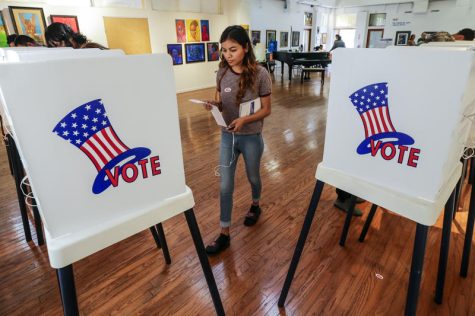Water as a commodity raises many issues
May 19, 2021
At the beginning of 2021 there was a lot going on. Donald Trump was attempting to overturn American Democracy, the public was in desperate need of pandemic relief, and we had just started rolling out the COVID vaccine. It was easy to lose important stories in the fold. So, now that the news cycle has calmed down, we’re going to swing back around for this one. Amidst the chaos, a plan that actually dates back to October 2020, came to fruition right before the new year. A plan to begin trading fresh water as a commodity on the stock market. At first glance that’s easy to pass over — not a particularly eye catching topic. However, beneath the surface, this is an issue that raises some real humanitarian questions and provides a disturbing look into the future of U.S. foreign policy. So, let’s take a second to revisit all this.
In order to understand why water’s addition to the market has such a big impact, it’s important to start with why it wasn’t there in the first place. Water has always been a precious resource and fits the traditional definition of a commodity (others include cattle, soy, gold etc…). However, at the advent of the NYSE in 1817, water was not nearly scarce enough to make the list. As we industrialized through the 1900s though, the need for large supplies of water grew rapidly and the first direct link between water and a cholera outbreak was made. By the 1900s the issue had come into a much clearer view. The management of water has traditionally been the job of the government, but in 100 years they have made seemingly no headway, leading up to one of the worst droughts in U.S. history in 2012. So, in truth, properly managing the proper distribution of water started as government responsibility. And, unfortunately, they have a long history of letting us down. And that brings us to 2020 where, ultimately, the government relinquished that job to big business.
Here is where the humanitarian questions come in. The government’s number one job is making sure its citizens are taken care of. Corporations though, they’re in it for the money. The reason the Chicago Mercantile Exchange gives for the move is to allow districts to freely trade water rights in order to better manage scarcities. However, that’s only half the story, because they can also sell rights to anyone on Wall Street. Effectively now anyone with an investment account or retirement fund can purchase the rights to water. Unfortunately, the way those investments make money is when there’s drought. So, a bet on water is basically betting on people’s suffering, hoarding an essential resource to sell in hard times at a premium.
The sharp increase in demand for water isn’t only being felt by us. According to the United Nations, “Water consumption has doubled over the past 50 years, 2600 million people do not have access to basic sanitation.” Water scarcity is a global problem.
As published in Bloomberg, August 6, 2019, “Nearly 1.8 billion people in seventeen countries, or a quarter of the world’s population, appear to be veering towards a water crisis—with the potential of severe shortages in the next few years.” By handing over control of rights to the public sector, the U.S. seems to be tying their own hands in terms of future foreign policy decisions to address it.
Nevertheless, at an address in Chicago, Vice President Kamala Harris said, “You know, for years and generations, wars have been fought over oil. In a short matter of time they will be fought over water.” Wars over water are not a new phenomenon in history, they’ve occurred all over the world. But, its relevance in US foreign policy has never been more plainly stated. Water is becoming an extremely valuable commodity, and times are getting desperate.
Water is something that’s easy to take for granted as an American. Access to it here is generally as easy as turning on the tap, or buying a bottle. However, there’s a lot going on behind the scenes and it’s quickly becoming a more valuable commodity. The New York Stock Exchange started trading water rights this year, and funds like the invesco S & P Global Water index ETF have seen over 30% growth since its addition. Water is going to be of growing relevance in our political and economic outlooks over the next decades, so it will be an important conversation to follow up with. We should all be keeping a closer eye on what happens to our water.










